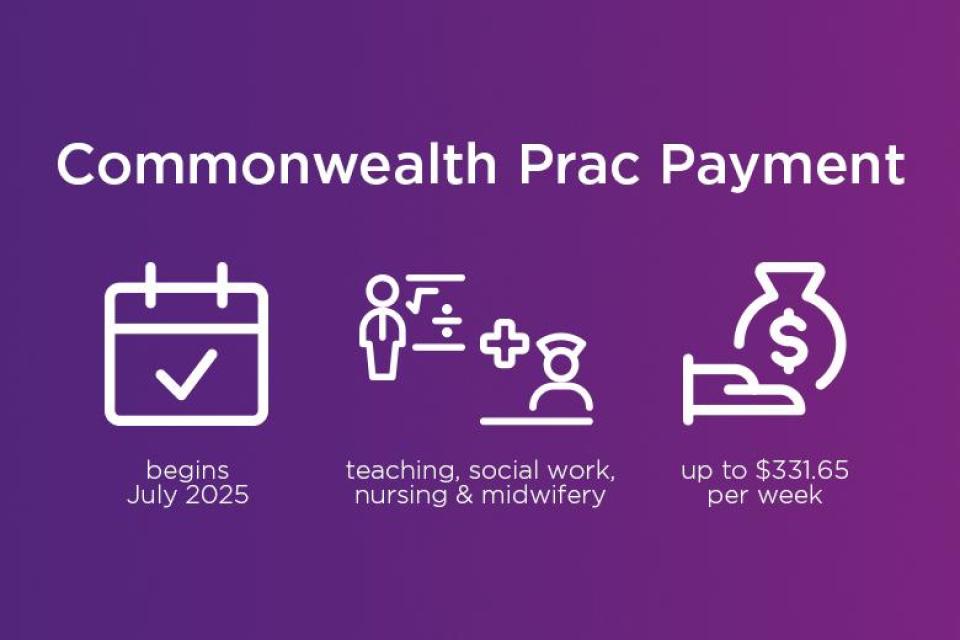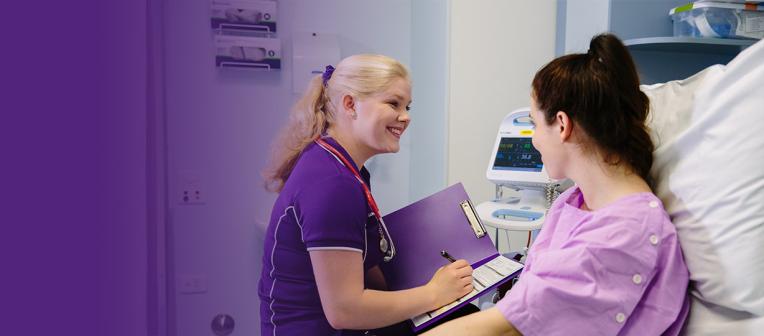Degrees that include mandatory placement are both challenging and rewarding. The Commonwealth Prac Payment offers vital financial support to ease the costs associated with your placement.
Choosing a degree with a mandatory placement, like nursing, teaching or social work, opens up so many pathways to a meaningful career. Placements allow you to put theory into practice and begin using your new skills in earnest. Many students find their placements to be the most rewarding and transformational part of their time at uni.
While placements are an important part of your learning experience, they can also be financially challenging. To help, the Australian Government is introducing the Commonwealth Prac Payment (CPP), a new initiative to ease the costs of placements.
Here’s a quick guide to how this payment can benefit you.
What is the Commonwealth Prac Payment?

The Commonwealth Prac Payment is financial aid from the Australian Government. It helps students cover the costs associated with mandatory placements required in their studies. This aid is for students in teaching, nursing and midwifery, and social work programs at higher education institutions, including UQ, as well as nursing students in vocational education and training (VET) courses.
These payments are expected to assist around 68,000 students, addressing the ‘placement poverty’ caused by students having to support themselves during unpaid internships and work experience, typically over a period of 16-26 weeks. The CPP can also help ease the other costs associated with undertaking an unpaid placement, such as:
- travel and accommodation, particularly when the placement is located far from home or campus
- materials and uniforms required by the workplace (fortunately, these materials and uniforms will likely be useful again when you step into a paid position).
Ultimately, with the help of a CPP, you’ll be able to focus on your education and practical training without the shadow of financial hardship looming over you the whole time.
Key benefits of the Commonwealth Prac Payment
- Starting 1 July 2025, eligible students can receive $331.65 per week during their placement. This amount is based on the single Austudy rate.
- The payment is available to those already on Commonwealth income support payments such as ABSTUDY, Austudy, Youth Allowance or DVA Education Allowance (and who meet the other eligibility criteria) OR is means tested, so it helps students who need it most.
- Both full-time and part-time students can receive the payment.
Who is eligible for the Commonwealth Prac Payment?
You need to meet specific criteria to be eligible for the CPP as a bachelor's or master's student. The main eligibility requirements are as follows:
- domestic student
- enrolled in a Commonwealth Supported Place (CSP)
- completing a bachelor’s or master’s program that leads to entry-to-practice in teaching, social work, nursing or midwifery
- undertaking mandatory placements.
Your mandatory placement needs to be on average 30 hours or more per week for the duration of your placement. If you are studying midwifery, you are also eligible if you are undertaking a continuity of care placement.
As mentioned above, you also need to be currently receiving a Commonwealth income support payment OR fulfil means-testing criteria.
How to access the Commonwealth Prac Payment
- You must be enrolled in a mandatory placement as part of your program in teaching, nursing, midwifery, or social work (from July 2025).
- Students will apply to their higher education or VET provider for payments. UQ students should apply through UQ (more details will be provided by your placement coordinator after enrolment).
UQ programs eligible for the Commonwealth Prac Payment
UQ's 5 undergraduate dual degrees in secondary education are eligible (combining education with maths, arts, business management, science or music), as is the Bachelor of Education (Primary) (Honours).
- Master of Teaching (Primary)
- Master of Teaching (Secondary)
- Bachelor of Nursing
- Bachelor of Midwifery
- Bachelor of Nursing/Bachelor of Midwifery (dual degree)
- Master of Nursing (Graduate Entry)
- Bachelor of Social Work (Honours)
- Master of Social Work (Qualifying)
- Bachelor of Health, Sport and Physical Education (Honours)
Please note that not all programs with a mandatory placement are covered by the CPP. If your program isn’t listed above, you most likely won’t be able to access this payment. For example, degrees in dentistry, physiotherapy, speech pathology, audiology and occupational therapy are excluded. Programs that offer optional placements aren’t included either.
What does the new Commonwealth Prac Payment mean for students? Will it do enough to end ‘placement poverty’? Get more insights from The Conversation.





